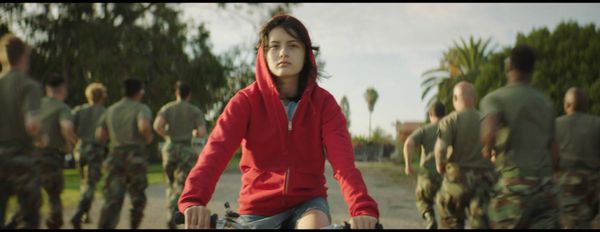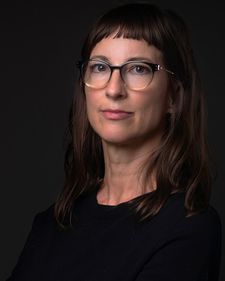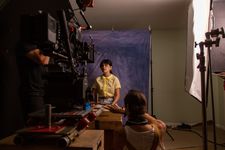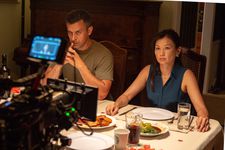 |
| Oona Yaffe in Picture Day |
The story of a frustrated 12-year-old on a military base trying to fit in at a new school and fighting with her parents in the run-up to getting her school photo, Picture Day isn’t the short of short film you’d expect to qualify for the Oscars. It’s not a message film. It doesn’t represent a cause. It might very well be thought of as political, but not overtly so. It has made it through the festival qualifying process based on merit. It’s one of the very best shorts in that position this year.
When I meet writer/director Kelly Pike to discuss it, she immediately tells me that she too is surprised by the film’s success.
 |
| Kelly Pike |
“This is the story I really wanted to make and the story I really want to tell. So, you know, everything else be damned,” she says. “Inspiration came from a few different places, but when it gets down to the ideas I'm exploring and the story I'm wanting to tell, the thing that's most central is I want to make sure I'm telling the story of this girl and her mother with the dignity that I think a lot of times we don't lend to women's stories and girls’ stories and their emotional lives. A lot of times I feel like our narratives around them tend to be really flattened. Their emotional experiences tend to be trivialised. So I wanted it to be just the nuance of everyday experiences being told with the dignity that any human drama deserves.
“The specificity came from a few really specific seeds. My last film had been about sexual assault on a high school field hockey team, which is more directly about this easily pointed-to monster. But I found myself thinking – especially as we're coming out of the #MeToo movement and we're really in the aftermath of all that, and we're looking at how gender inequality really is playing out in the culture – I found myself thinking that we're not doing ourselves any favours if all of our stories are about these very easily pointed-to monsters. Are we not accepting any culpability as a culture about what everyday messaging we’re giving to our children and how it ultimately limits their sense of possibilities in their own futures?
A friend of mine at one point, a grown woman, had said she wished she was the girl she was when she was 12. And it's funny because I instantly knew what she was talking about. It's like this last moment before you have to start performing so much of what everyone else wants. And so I was thinking a lot about that age and what happens at that age. And it turns out actually some psychologists have studied this, and for children being raised as female, around the age of 11 to 13, they tend to lose about 80% of their confidence – whereas for children being raised as male at the same age, it tends to go up about 80%. And of course there's exceptions in all this, but it just got me thinking, like, is it a coincidence that at that age we're becoming very tuned into what's expected of us in terms of gender performance?
“I had been raised on military bases, so one of the things that was also in my mind was realising it was a subculture I never saw represented when I was growing up. And I still don't see it represented anywhere, the domestic side of military life. We see the war and heroism and the soldiers, etc., but we don't really see what the lives of the people who are dependent on the service members are, and what exactly that means. I had an urge to consider that and it occurred to me, wait a minute, if you're telling a story about identity and how we form our sense of ourselves, what better pressure cooker to put it in than a military family that moves every couple of years, forcing people to reexamine how they understand themselves and who they are.
“Finally, when the bargain of haircut for earrings entered my head, I thought, you know, how interesting – I love that her body becomes this battleground for her parents’ issues, and what an apt metaphor for what it means to enter womanhood! All of it suddenly crystallised into like, ‘Yes, this is what I want to explore.’ And ultimately it’s about the effect of our everyday messaging around gender, and what effect it has gender on our understanding of our own power and self.”
I ask her about the lively movement of the girl – and the camera – at the start of the film, and how that slows down later on, suggesting a loss of confidence and reduction of possibilities.
“ Yes, very much,” she says. “Of course, as filmmakers, especially with short films, we have so little real estate to try to get in all of these ideas. For me as a filmmaker, I'm much more interested in the nuance and the subtlety that reflects more what I think about how we're getting messages and learning in daily life. Which means every decision, every tool you can use as a director to tell that story feels so important. So even the things like the camera movement and yes, at the beginning there is more possibility, there is more movement, she is more involved.
“As she comes to more and more of an understanding, things are narrowing a bit. But also finally in the end, when we've got her countdown of “1, 2, 3,” and we see her just being able to make the choice of whether or not to smile, what she is going to do with her body in that moment. The stillness, I think, is more about gaining control back or finding a way in which you can claim some power even within all of this narrowing of possibilities that's been happening.”
I tell her that I love the dense layering of ideas in the film, and she’s pleased, but confesses that she fears most people prefer a bigger, easier-access single idea. We then discuss the brother in the film and how, despite the military environment, he gets to have long hair and dress in his own way and nobody seems to care about that.
“Yeah, he gets a bit of a pass, doesn't he? Were it his story, of course, we would deal with a different set of issues, but I think for this he becomes a tool to highlight her reality of having so much more pressure and focus on her appearance and what she is allowed or not allowed to do.”
 |
| Behind the scenes with Oona Yaffe in Picture Day |
The first indication that we get of this is a note that she gets thrown at her at school, which suggests that a lot of it is coming from her peers and not just from adults.
“Exactly, exactly. And that's what's important. For me, this isn't a story to indict her parents, by any means. This is everybody. This is our entire culture. We're all culpable in how this messaging is carried forward from one generation to the next. And also, her parents, in terms of identity, are suffering just as much within the same societal structures. This isn't about blame. This isn't about parents doing something wrong. This is about how everybody is playing a role in a larger system we don't have control over.”
When the family moves, I note, the kids have school and the father has work and the friends who move with him, but the mother is all alone at home, and therefore all the more emotionally dependent on her husband.
“ Yeah. Which is already a difficult situation. But also these particular people, you have to realise, their entire lives have been a training that's meant to teach them to divorce their emotional selves a bit because it is basically a job necessity, and that's the person they're dependent on. I saw her mother as the beacon of where she's headed. That character was so much the beacon of what comes next. And of course, the idea of the mother's identity also being so sadly compromised. Because, you know, because of the. When you have moves every couple of years, when you got married at a very young age, how do you ever finish a college degree or build a career or go on and have your own identity? Like you said, the father has his career. He's probably climbing in the ranks, headed towards retirement, but sadly, in this situation, the wife does not.”
Parts of the film are rooted in her personal experiences.
“I just remember it was a joke in the family that I wanted my ears pierced at a point that was too young. And so my father said flippantly one day ‘Well, sure, cut your hair,’ because I did not want to cut my hair. And there's a joke about how headstrong I was, that I was like, ‘Fine.’ And so then they had to do it. I don't totally remember all of that experience, but I think that's where the idea came. And part of what I loved about it was this idea that ear piercing is one of the only things we have that feels like a cultural stepping into womanhood. Like a ritual that means a passing into the next stage. It's so viscerally about piercing the body and causing real change. And then hair, of course, is sort of one of our secondary sex characteristics.
“With little kids, we're so much more free about them. They can do whatever they want, but suddenly it begins to matter when they're at that stage where gender equates to social status. So it felt like hair and ears in particular needed to be part of this bargain because they are symbols of what she's moving into.”
The girl enjoys collecting butterflies.
“It's interesting because the butterflies are more compliant. I loved her from the beginning when I imagined this character as an entomologist. It's this thing that is outside of what was acceptable for female interests. Bugs and dead butterflies, and her own specific interest has been sparked in this amateur entomology. Dead butterflies in particular were these remnants of how you get lessons around beauty. It's like trying to steal the clues from the remnants around you, and what you can collect are these dead versions of beauty.
“I love them as a way of her collecting specimens from every place she's been, as a way to try to piece together her own identity. One of the things I really remember about being that age and growing up is this sense of always trying to find the clues and study everything. I do wonder how much of that is because I was always moving, so there wasn't this really stable sense that I imagine some people have if they fit right in to what they've grown up with and they have a hometown and they have the same people. I imagine there's somewhat more of a sense of stasis and what your identity is.
“Because the butterfly is an often overused metaphor for the becoming, I thought there was also something wonderful about how we could play with that. There's a little bit of a double edged sword in her coming out of the cocoon. On the one hand you are now coming out as the butterfly you're supposed to be, and into all the beauty that you're supposed to be, in terms of expectations. And therefore headed on the path of her mother, perhaps. But what was really happening with this child? There’s that countdown in the film, the “1, 2, 3,” and we see this slow dawning of what this experience has taught her, what it brought her to.
 |
| Behind the scenes with Michael Perl and Michelle Krusiec in Picture Day |
“My hope is that it's some sort of sense of ‘You're never going to be able to please everybody. You're never going to be the version of a girl that's acceptable at this school and then the next one, and then the next one and the next one. You're not going to be able to mend your parents’ marriage. None of your decisions are going to be just right for all of this. So how do you stand by yourself?’ I think there is this slow dawning of how all of these decisions lead to having power or not in the future.
“As she watched that debate she was learning so much more than she perhaps wanted to know about gender and power and how things really stand in the world. And at the end of the day, all she has is herself. Because all of this is kind of a bullshit bargain, you know? At the end of the day she needs to honour herself.”
The film’s festival journey has far exceeded her expectations.
“We had our première at Palm Springs which was thrilling. I love Palm Springs. It's an amazing short film festival. And then on top of that, it won a jury award there, and they included it in their best of the fest. All of it had just been this shocking and wonderful experience. When you go into a story that's this specific and it's so reflective, and you feel like only you can tell it and maybe nobody else is interested in it, there's always this worry that people won't respond. All the positive response that's happened with festivals wanting it has all just been like icing on the cake.
“Honestly, the most thrilling part was when I got to play it in Virginia and so many people in the area that I went to high school in could come up and watch it. Often they don't get to see my films because of course it's not an area that has film festivals. But they all travelled. They'd all been tracking this on social media and many of them also had come out of military families because it's an area that has several military bases. It was so meaningful for them, from what I hear, to see portions of our reality on the screen for the first time.
“It's been so cool – I can't emphasise that enough – seeing that people relate to this character and relate to the story and connect with it and are giving me that feedback. I walked into it with the fear that nobody was going to be able to relate. I just wanted to make it anyway because I do want to honour that experience and that girl, everything else be damned. But it's wonderful that people are connecting with that. I just feel super grateful that people have been so supportive.”





















